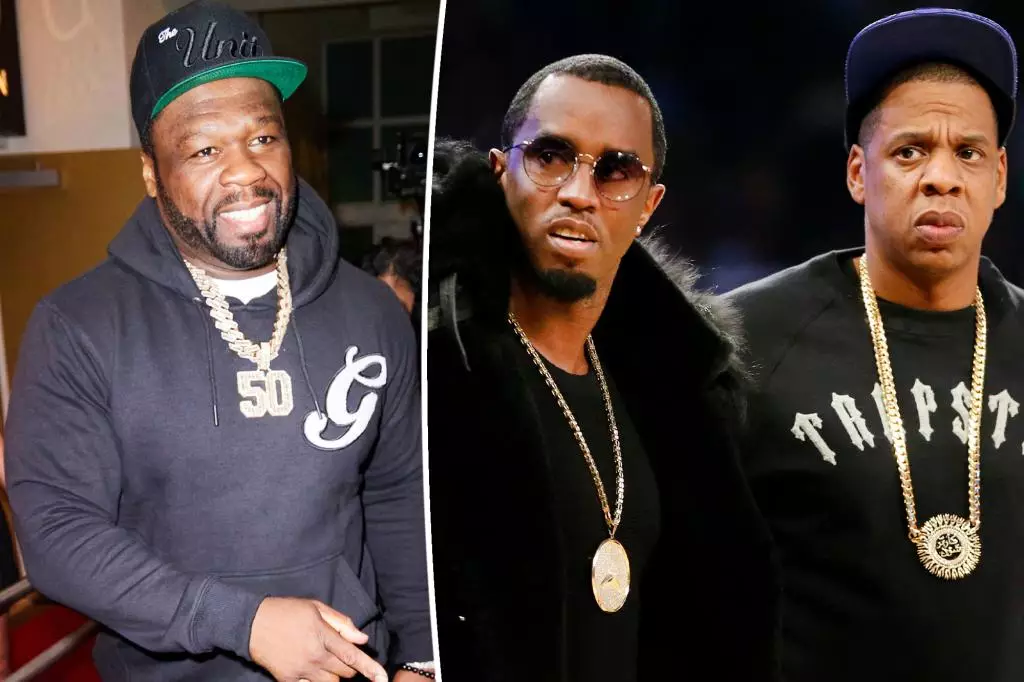In the cutthroat world of hip-hop, rivalries can often eclipse musical legacies, and the recent jabs from 50 Cent towards Jay-Z exemplify this phenomenon. On social media, the “In da Club” artist had some biting words regarding Jay-Z’s connection with Sean “Diddy” Combs, a friendship now fraught with controversy. With a post that featured nostalgic photos of Jay-Z and Diddy, set to the backdrop of Bill Withers’ soulful “Just the Two of Us,” 50 Cent’s intentions were clear: to stir the pot and draw attention to the murky circumstances surrounding Combs, whose recent legal troubles have painted a complicated portrait of the music mogul.
The Shade and the Backstory
50 Cent’s commentary wasn’t merely for entertainment; it was steeped in historical context. Referring to an event from 2012 where Diddy allegedly became violent over personal grievances with Kid Cudi, 50 Cent’s caption dripped with sarcasm, questioning Jay-Z’s loyalty amidst Diddy’s scandalous behaviors. The implication is potent: Can one truly separate business from personal integrity in hip-hop? The complexities of their friendship take center stage when faced with the allegations and lawsuits now swirling around Combs, including a serious one concerning physical abuse filed by model Cassandra Ventura.
This layer adds depth to 50 Cent’s commentary, as he capitalizes on this situation to draw distinctions not just between rappers, but between their approaches to fame and infamy. Cudi’s car explosion—a bizarre anecdote—is a stark reminder of the lengths to which some might go to protect their territory, encapsulating a reality that many in the industry prefer to sidestep.
50 Cent: The Master of Provocation
Throughout their careers, 50 Cent has earned a reputation as the unmatched provocateur in hip-hop. His persistent trolling, especially regarding Combs’ ongoing legal battles, underscores a strategic approach: leverages of public scandal can bolster personal narratives. While detractors might view him as insensitive or excessively aggressive, his actions compel us to consider the often-ignored dark side of celebrity culture. Bad reputations can create opportunities, and 50 seems all too aware of this synergy.
The recent legal troubles for Combs have provided him with a plethora of material to work with. As allegations surface regarding sexual misconduct, and serious charges pile up, 50 Cent has unrepentantly capitalized on the drama to position himself not only as a commentator but as the “BOSS” of this rap narrative. Yet the question lingers: is it just rivalry for rivalry’s sake, or does he genuinely believe he is in a moral high ground, pointing out flaws in his industry peers?
Cultural Context and Consequences
This duel of words doesn’t happen in a vacuum; it reflects broader dialogues about accountability and legacy in the hip-hop community. Jay-Z’s attempts to distance himself from Combs’ controversies, including a firm denial of any wrongdoing, raises ethical dilemmas regarding relationships in a world where public perception can be as powerful as the music itself. As allegations surface and lawsuits unfold, could we see a shift in how artists navigate their associations? The “friends till the end” mantra becomes laughably ironic when weighed against the gravity of abuse allegations and backroom dynamics in the industry.
In this game where perception can often be crafted better than reality, 50 Cent’s audacity may be more than mere rivalry; it could be an alarm bell, urging everyone—fans and artists alike—to confront uncomfortable truths hiding behind the charming facade of celebrity camaraderie. As the story continues to develop, one thing is crystal clear: the battle for supremacy in hip-hop is never just musical; it’s often a fight for moral clarity and cultural integrity.
